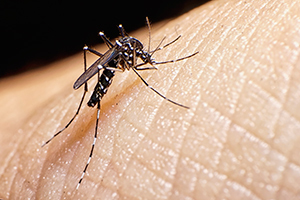 Aedes aegypti mosquito
Aedes aegypti mosquito
A team of researchers from the University of Notre Dame’s Eck Institute for Global Health (EIGH) has received a grant from the USAID to pursue a novel solution to the Zika outbreak. The team, led by Molly Duman Scheel, an associate professor of medical and molecular genetics at the Indiana University School of Medicine-South Bend (IUSM-SB), associate adjunct professor of biological sciences at Notre Dame and member of EIGH, is developing an insecticide to destroy Aedes aegypti larvae before the mosquitoes are able to hatch and transmit Zika.
Scheel’s lab has been developing a novel class of larvicides known as Yeast Interfering Larvicides that kill nearly 100 percent of larvae in a laboratory setting. According to Scheel, the larvicides are designed to specifically target mosquito genes, but do not correspond to genes in humans or other non-target species. The USAID grant will enable the researchers to conduct a field evaluation of the approach at a Notre Dame-affiliated center in Belize.
The members of Scheel’s research team, including Keshava Mysore, Limb Haparai and Kathy Eggleson, will work with their EIGH colleagues, including Scheel’s longtime collaborator David Severson of Notre Dame’s Department of Biological Sciences, and Na Wei, a yeast genetics expert from Notre Dame’s College of Engineering, who is helping to develop the technology. Biologists John Grieco and Nicole Achee, Eck Institute researchers who manage the Belize Vector and Ecology Center, have a 20-year relationship working on mosquito-borne diseases in collaboration with the Ministry of Health in Belize. They will work with Scheel and the ministry to test the larvicides in the field.
Scheel’s research on the development of interfering RNA technology to target vector mosquitoes has been previously funded by the National Institutes of Health and the Bill and Melinda Gates Foundation. Scheel indicated that her collaboration with Wei, a recent Notre Dame faculty hire, enabled them to develop a safe and affordable natural yeast delivery system for their interfering RNA pesticides. Yeasts have been cultivated worldwide for thousands of years, and this technology can be adapted to resource-limited countries with constrained infrastructures.
Notre Dame has a long history of mosquito research, studying both Aedes aegypti and Anopheles gambiae species and vector control and using mathematical models to better understand the dynamics of infectious disease transmission and control. The Eck Institute for Global Health, a University-wide enterprise, recognizes health as a fundamental human right and endeavors to promote research, training and service to advance health standards for all people, especially people in low- and middle-income countries, who are disproportionately impacted by preventable diseases.
Contact: Molly Duman Scheel, 574-631-7194, mscheel@nd.edu